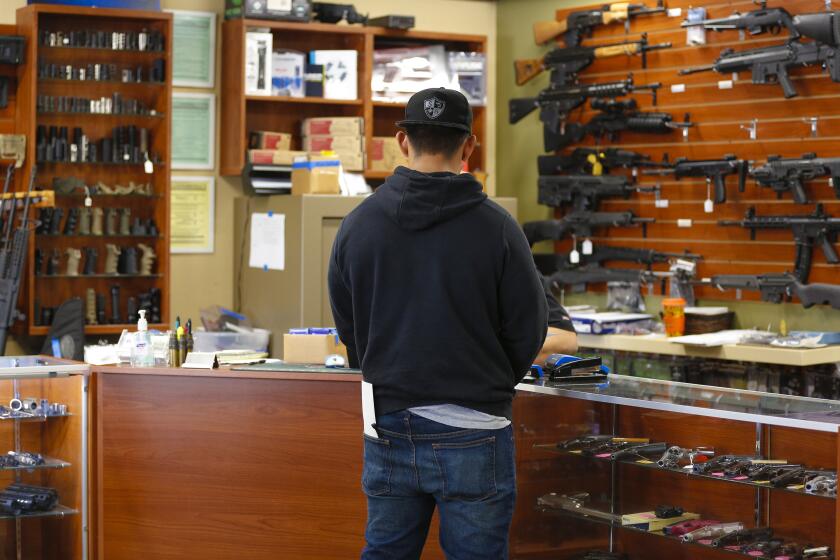Apodaca: Like many of us, Bodie is taking a cautious approach to the future
- Share via
My dog Bodie is a sweet, handsome yellow lab with simple tastes. He loves food and sleep.
Life with Bodie, however, has been anything but simple. He joined our family more than three years ago after we found him through a rescue organization. We had no information about his previous circumstances but it was obvious he’d had it rough, and the transition to stability was difficult.
It took time and many food bribes to gain Bodie’s trust, but eventually he made great progress. He maintained some nervous tics — he’s skittish around tiny, yippy dogs, for instance — but mostly he has settled down. Now he lets us hug and pet him extravagantly, and he no longer reflexively jerks every time someone makes a sudden movement.
Bodie will always be an anxious, sensitive fellow, but I can confer upon him the highest of canine compliments. He is a very good boy.
But lately something is up with Bodie, and I think the COVID-19 pandemic is indirectly to blame.
It all started after my husband and I were fully vaccinated and decided to celebrate our wedding anniversary by eating out at our favorite sushi restaurant. We were gone for two hours tops, but we later realized that it was probably the first time in about a year that Bodie had been left entirely alone.
After that night, Bodie was suddenly afraid of the stairs in our house — behavior we hadn’t seen since we first adopted him. Back then my husband patiently coaxed him up the steps with treats, and soon he was bounding upstairs without hesitation.
Gun violence killed nearly 20,000 Americans in 2020, more than any other year in at least two decades, according to the Gun Violence Archive.
This time around, even the lure of food wasn’t working. He avoided the stairs, despite knowing that his cozy bed on the floor of the master bedroom awaited him there. He ran in circles around the house when he thought someone might try to maneuver him up.
His fear of steps was so acute that he was even apprehensive around exterior doors. He’d stand at an open sliding glass door, warily tapping the threshold with alternating paws, as if trying to summon the nerve to step across.
In a way, I think I get it. Perhaps Bodie was exhibiting his version of the anxiety I also feel now that California has fully “reopened.”
Like others who have followed the social distancing protocol over the past 15 months, I have been eagerly awaiting this moment. But now that it’s here I’m a bit like Bodie at the threshold, gingerly testing each step before moving forward.
I’m trying to remember what normal feels like, while also striving to determine exactly what normal means now and which changes are here to stay. Openness notwithstanding, the world still seems different.
In keeping with my cautious nature, I’m taking it slowly — a sunset picnic with close friends at Big Corona Beach, inching toward a higher level of comfort during shopping excursions, ditching the mask more often. Baby steps.
Yet baby steps, at least when stairs were involved, were still too much for my dog.
I asked our veterinarian, Dr. Randall Aten, the kindly owner of Corona del Mar Animal Hospital, for a spitball psychoanalysis.
While humans were going nuts with pandemic restrictions, Dr. Aten told me, many pets actually fared well.
“Pets are happiest when their owners are around,” he said. “I think they thought this was a pretty sweet deal.”
A few months after the pandemic began the demand for veterinary services skyrocketed. Dr. Aten attributed this onslaught to people spending more time with their pets and becoming more attuned to minor problems, and to the rush of pet adoptions by people seeking furry companions.
Now, as the pandemic wanes, restrictions are lifted, and people return to work and social gatherings away from home, pets might experience separation anxiety. Those issues will be most pronounced among rescue animals like Bodie, he said.
All told, the changing home environment “is going to hit the pet population pretty hard. They have to adapt to new routines.”
It’s also likely that Bodie carries residual trauma from his earlier life, Dr. Aten surmised. The changes occurring within our household are now triggering his stress and causing him to revert to previous patterns.
So what should owners do?
It’s important to remember that pets aren’t acting with malicious intent. They’re just anxious, he said.
“Some dogs are so anxious they can destroy a home. They dig at doors, chew dry wall, howl. People put them in crates and they break their teeth trying to chew through the wires. It can be very extreme.”
Punishment is the wrong response, he said. It creates more anxiety without solving the underlying problem because the pets won’t connect the punishment with the offending behavior.
“I’m from the aspect of how am I going to help this dog,” he said. He recommended a gradual process of desensitization. Go through routine departure clues — picking up keys, grabbing a purse, giving the pet a treat — then go outside, initially for a minute or two, slowly increasing the time away.
And if the pet goes wild with excitement when the owner returns, it’s best to wait until they’ve calmed down before rewarding them with attention.
A few days after I spoke with Dr. Aten, Bodie, unprompted, followed my husband upstairs. Like many of us, he’s been tapping the threshold of an uncertain new reality and finally decided to venture forth.
All the latest on Orange County from Orange County.
Get our free TimesOC newsletter.
You may occasionally receive promotional content from the Daily Pilot.





